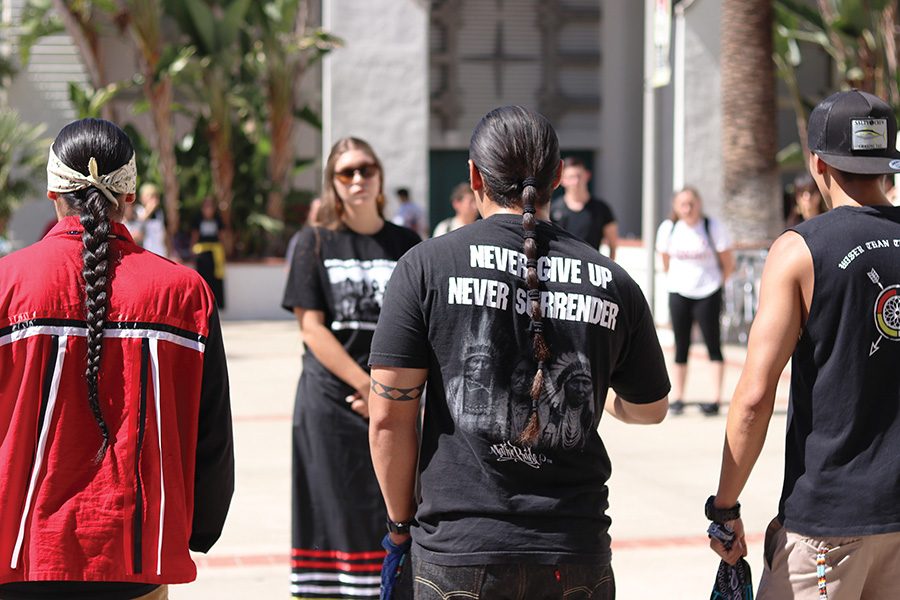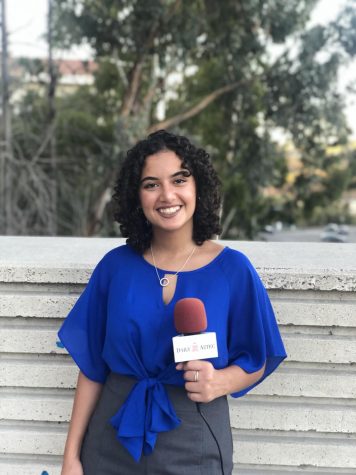The San Diego State Native American Student Alliance held its first Indigenous Peoples Day rally Oct. 5 in protest of Columbus Day.
NASA organized the rally in front of Hepner Hall at noon, chanting and singing “bird” songs.
Organizers said the rally was to draw attention to the injustice of the holiday and showcase the diversity of indigenous cultures.
“Celebrating Columbus is a narrative that celebrates genocide and invasion,” said SDSU NASA president Marissa Mendoza. “Our education system has failed us in many ways, and it’s erasing Native Americans from history books.”
Mendoza said the main goal of the rally is to abolish Columbus Day and promote indigenous identity.
“The rally should open up a conversation of San Diego as a whole denouncing Columbus Day and declaring it Indigenous Peoples Day,” Mendoza said.
Sustainability senior Brie Hornig said the rally was “like a form of resistance.”
“I think this is a time that native people can really re-claim (the holiday) and be able to celebrate their rootedness in resilience,” Hornig said.
Lane Yazzie, SDSU NASA’s public relations officer, said Columbus Day celebrates colonization and genocide of indigenous people.
“The rally is about educating non-natives about native issues and making sure history is accurately portrayed and uniting other indigenous groups within San Diego,” Yazzie said. “We decided to host the rally to raise awareness about abolishing Columbus Day and switching it with Indigenous Peoples Day.”
Kumeyaay community member Joseph Alvarado, who is not a student, said the bird songs sung by rally-goers were creation stories.
“There are some songs that are very sacred. There are some songs that are social. Each song describes our ancestors’ hardships from when they began to travel, getting kicked out of where their original lands were/”
“They are passed down from generation to generation,” said Joseph Alvarado, a non-student and a member of the Kumeyaay community. “Each song describes our ancestors’ hardships from when they began to travel, getting kicked out of where their original lands were.”
Alvarado said he was at the rally to fight for change.
“I am a direct descendant of the ancestors and it really hurts to think what they had to go through,” he said. “And what they did go through is the only reason I’m here today, because they didn’t give up and they kept fighting. And I’m not going to give up and I’m going to keep fighting.
Bioengineering graduate student Maricruz Carrillo said she was at the rally to support her fellow Native American students.
“It’s ridiculous that we’re still celebrating a man (who) slaughtered and completely took over the land of the people that were already here, yet he’s still celebrated as a hero,” Carrillo said.
Hornig said she hoped the rally would spark a conversation about past injustices against Native Americans.
“People who are walking by may see this type of thing and they may think twice to themselves, like really thinking deeper into the things we accept as normal, like Christopher Columbus Day,” she said.
But she was also a little pessimistic.
“I also think there will be the people who really don’t think twice about it because there (are) a lot of people who, if it doesn’t affect them directly, then they won’t really think twice about it,” she said.









